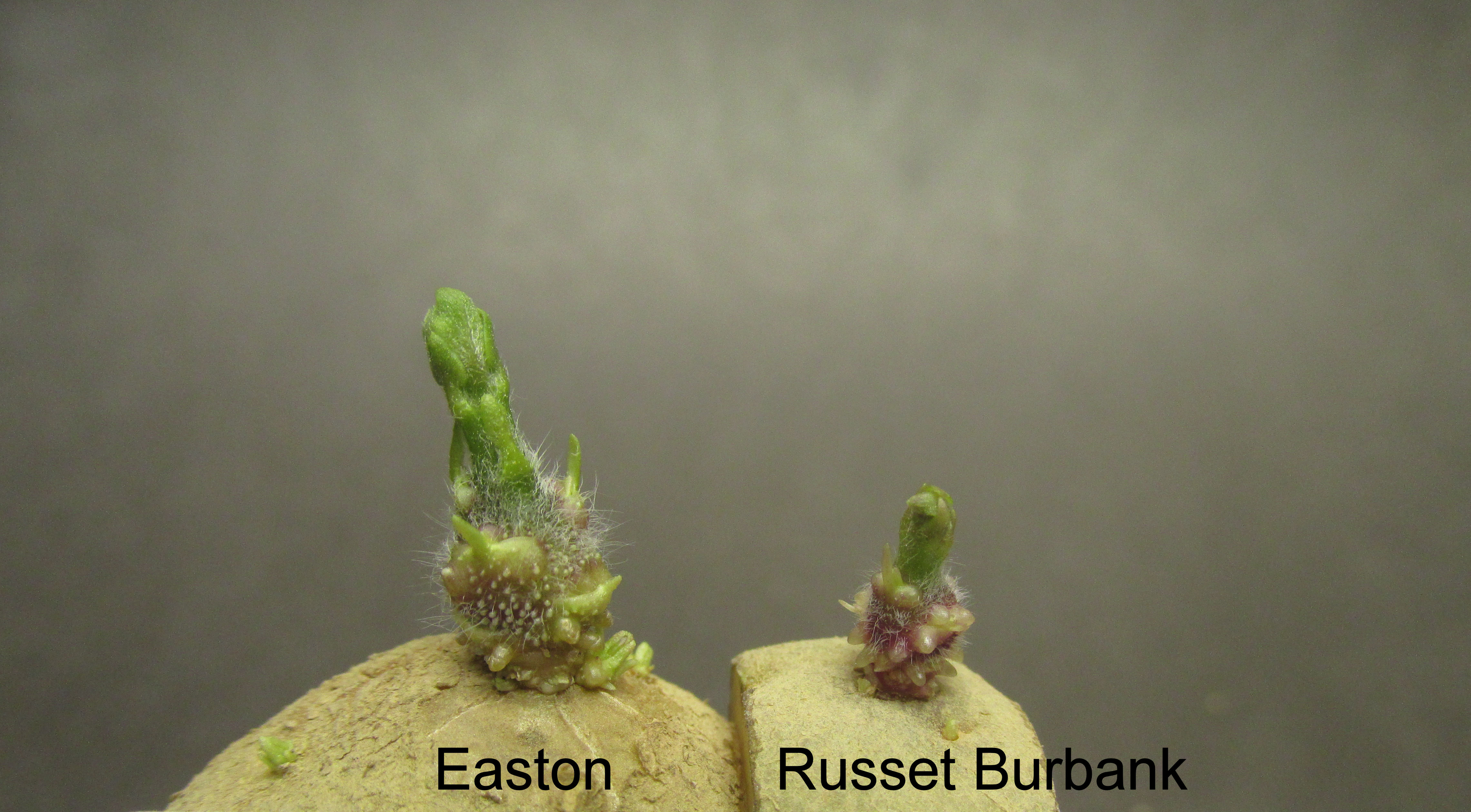Easton
| Denomination: | 'Easton' |
|---|---|
| Botanical Name: | Solanum tuberosum |
| Applicant/Holder: |
University of Maine Board of Trustees 15 Eastabrooke Road Orono, Maine 04469 United States of America |
| Breeder: |
Greg Porter, University of Maine, Orono, United States of America |
| Agent in Canada: |
Global Agri Services Inc. 376 New Maryland Highway New Maryland, New Brunswick E3C 1E5 Canada Tel: 506-462-9493 |
| Application Date: | 2014-01-07 |
| Application Number: | 14-8498 |
| Grant of Rights Date: | 2017-03-14 |
| Certificate Number: | 5439 |
| Grant of Rights Termination Date: | 2037-03-14 |
Variety Description
Variety used for comparison: 'Russet Burbank'
Summary: The size of the lightsprout of 'Easton' is medium to large whereas the lightsprout of 'Russet Burbank' is small to medium in size. The plants of 'Easton are shorter than the plants of 'Russet Burbank'. The distribution of anthocyanin colouration on the stem of 'Easton' is along the entire length whereas for 'Russet Burbank', the distribution is at the base only. The openness of the leaf of 'Easton' is intermediate between closed and open whereas the leaf of 'Russet Burbank' is open. The extent of anthocyanin colouration on the upper side of the leaf midrib of 'Easton' is high whereas the extent is medium for 'Russet Burbank'. The size of the corolla of 'Easton' is medium to large whereas the corolla of 'Russet Burbank' is small. The anthocyanin colouration on the inner side of the corolla of 'Easton' is of medium to high extent and weak intensity whereas the anthocyanin colouration is absent for 'Russet Burbank'. The colour of the tuber skin of 'Easton' is light beige whereas the tuber skin of 'Russet Burbank' is reddish brown.
Description:
LIGHTSPROUT: medium to large, ovoid shape, few root tips, short lateral shoots
LIGHTSPROUT BASE: medium intensity of anthocyanin colouration, absent or low to medium proportion of blue in anthocyanin colouration, medium to dense pubescence
LIGHTSPROUT TIP: medium size in relation to base, closed habit, absent or very weak intensity of anthocyanin colouration, medium density of pubescence
PLANT: foliage structure is intermediate type where foliage is half open and stems are partly visible, semi-upright growth habit, mid-season to late maturity
STEM: low extent of anthocyanin colouration along entire length
LEAF: outline is medium size, openness is intermediate between closed and open, medium to dark green on upper side, high extent and weak to medium intensity of anthocyanin colouration on upper side of midrib, weak presence of secondary leaflets, absent or very low frequency of coalescence of terminal and lateral leaflets
SECOND PAIR OF LATERAL LEAFLETS: small to medium size, leaflet is narrower than long
LEAFLET: absent or very weak to weak waviness of margin, shallow veins, medium glossiness of upper side, glabrous blade at apical rosette
INFLORESCENCE: medium frequency per plant, medium size
PEDUNCLE: low extent of anthocyanin colouration
FLOWER BUD: high extent of anthocyanin colouration
COROLLA: medium to large
COROLLA (INNER SIDE): medium to high extent of anthocyanin colouration, weak intensity of anthocyanin colouration, absent or low proportion of blue in anthocyanin colouration
TUBER: long oval to long shape, white flesh
TUBER EYE: shallow, yellow at base
TUBER SKIN: light beige
Origin & Breeding History: 'Easton' (experimental designation 'AF3001-6) originated from the University of Maine potato breeding program. It is the result of a cross conducted in 2002 between the variety 'Silverton Russet', as the female parent, and the selection designated 'AF1668-60', as the male parent. The seeds from the cross were planted in a greenhouse during the spring of 2003 and the resulting seedlings were transplanted and grown in a greenhouse at the University of Maine's Aroostook Research Farm, in Presque Isle, Maine. From these, several of the largest seedling tubers were harvested to create a family of seedling tubers from the cross. This family of tubers was planted in the field during the spring of 2004. From these, selections were made in the fall of 2004 based on visual characteristics including tuber shape, appearance, size, and yield. Further evaluation of the selections was conducted over a number of years during which the evaluation was more intensive and the plots increased in size and/or the number of locations, so that progressively fewer clones were retained. Many traits were evaluated including yield, tuber size profile, specific gravity, ability to chip from the field and/or storage, freedom from internal and external physical defects, appearance, maturity, and yield. 'Easton' was one of the selections from 2004 which was retained throughout the selection process.
Tests & Trials: The comparative trial for 'Easton' was conducted during the growing season of 2015 in Drummond, New Brunswick. The trial consisted of a single, 18.5 metre long row containing 60 plants spaced 0.3 metres apart for each variety. The distance between rows within the trial was 0.9 metres. Observations and measurements were taken from 10 plants, or 10 parts of plants, of each variety. Mean differences were significant at the 5% probability level based on a paired Student's t-test.
Comparison table for 'Easton' with reference variety 'Russet Burbank'
Plant height (cm)
| 'Easton' | 'Russet Burbank' | |
|---|---|---|
| mean | 38 | 56 |
| std. deviation | 2.1 | 4.4 |
Click on image for larger view

Potato: 'Easton' (left) with reference variety 'Russet Burbank' (right)
- Date modified: